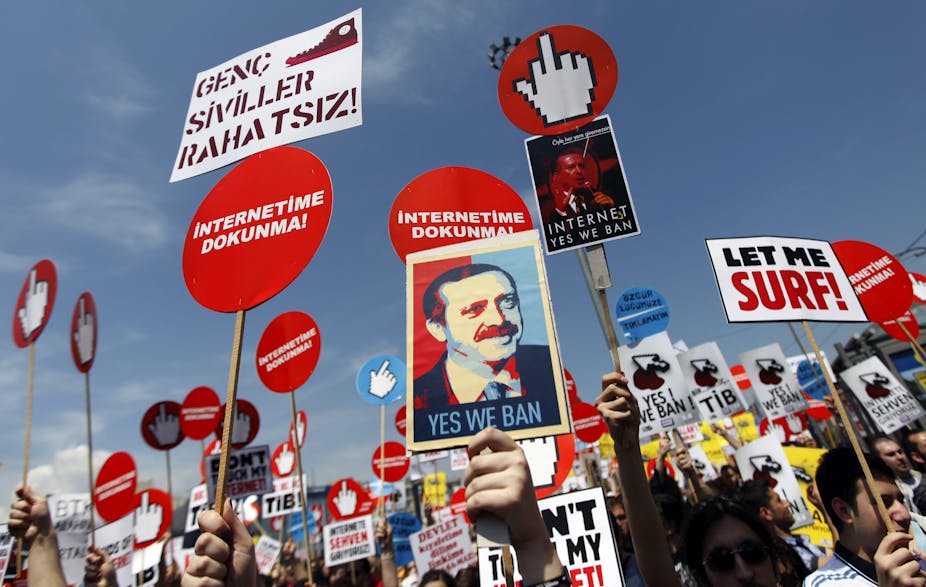Turkey has become notorious for curtailing media freedom and jailing journalists.
As well as persecuting journalists, the government often shuts down Facebook, Twitter or Youtube when street demonstrations and terrorist attacks occur. In 2016, America’s Freedom House defined Turkey as a “partly free” country with serious problems with civil liberties.
But social media still provides a crucial outlet for those who wish to bring censorship and intimidation to international attention. Despite increasing political repression, advocacy on a small scale has flourished through social campaigns. And this has allowed citizens to express their opposition to an authoritarian regime that polices their lives.
The right tools
Turkey has 46 million registered broadband users, a figure that has almost doubled since 2008. The number of mobile phone accounts have exploded since the 2000s, totalling 72 million users for a population of 77 million.
In the context of general political repression and the current state of emergency – in place since the attempted coup of July 15 – demonstrations in the streets present a high level of risk for campaigners. In this context, cyberactivism constitutes a real alternative for engaged citizens.
Recently, Academics for Peace campaigned against the ongoing trial of a number of Turkish scholars. Academics have been accused by the government of aiding a terrorist organisation – the Kurdistan Workers Party – for signing a petition calling for peace in the south-east of the country.
Many of these academics belong to international academic networks such as the International Sociological Association, the European Consortium of Political Research or the International Political Science Association. They have used these networks to mobilise professional associations, unions and European universities to send letters to the Turkish government and provide funds or scholarships for academics who have been fired or detained.
Online activism has also been mobilised against the proposed building of the Ilisu Dam, which threatened to flood the 12,000-year-old city of Hasankeyf. The aim of this campaign has been to raise awareness about the disappearance of this city.
Hasankeyf fills nine of the ten conditions for UNESCO to declare it a world heritage site, and the dam construction will forcefully displace 50,000 people.
To protest this development, a transnational campaign was collectively organised with Amazonian Indians, who were also threatened by dam-building. This cybercampaign caused the World Bank to abandon the project in 2008; European banks also withdrew funding. Eventually, the Turkish government decided to fund the project with its own resources, but a new Hasankeyf city has been built for inhabitants.
Gezi Park protests
The most iconic example of cyberactivism in Turkey remains the 2013 Gezi Park resistance. Istanbul’s attempt to destroy the park came to light thanks to the publication of emails, which started to emerge via different public and private organisations, such as the Movement of Urbanisation for People and the Union of Chambers of Engineers and Architects.
But it was Facebook and Twitter that proved decisive in the mass dissemination of information, and calls for protests. Calls for assistance and support were made using images of bulldozers cutting down a portion of the trees situated at the northern entry of the park on May 27 2013.

From May 31 to June 1, #DirenGeziParki – “Resist Gezi Park” – was the most common hashtag on Twitter worldwide. On May 31, more than 500,000 people used it to send some 37 million tweets.
According to an NYU report, there are usually between 9 and 11 million tweets sent per day in Turkey. When events began to unfold on May 31, the total number of tweets sent within Turkey reached 15.2 million. The same day, 558,000 Twitter users sent a total of 3.7 million tweets using the hashtag #geziparkı, or the words “Taksim” (the name of the district of Istanbul where the park is located) or “Gezi Parki.”
On June 1, during the biggest demonstration in Taksim, 27.5 million tweets were sent about the issue. Meanwhile, national media preferred not to talk about the uprising and to broadcast documentaries instead.
Citizenship constitutes an assembly of rights and duties – civilian, political and social – that locate an individual within the political regime. Cyberactivism could never replace real mobilisation in the streets. But in Turkey, where many rights are under attack, it can contribute to a form of active citizenship.
The increasing use of different internet platforms for activism brings citizenship beyond institutional design and allows people to contest political power, even in an oppressive and authoritarian state.

